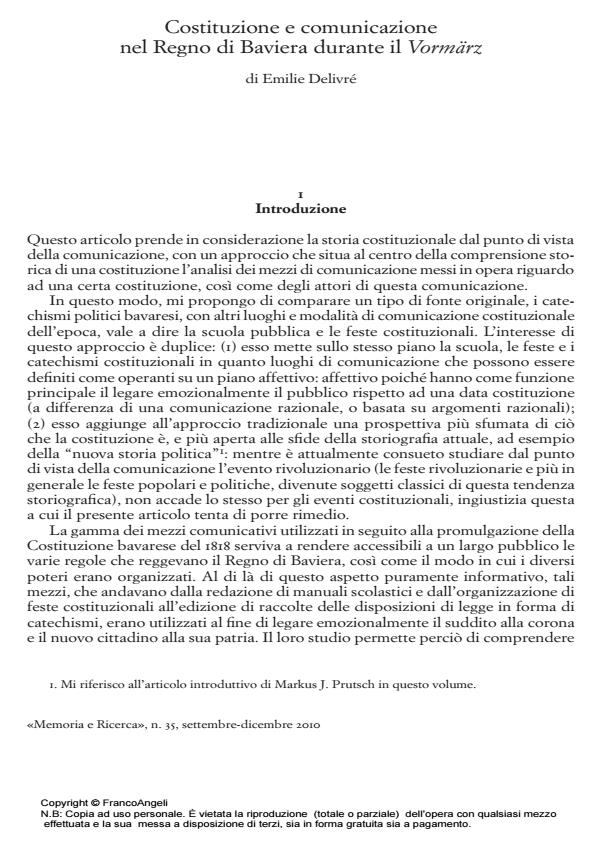Costituzione e comunicazione nel Regno di Baviera durante il Vormärz
Titolo Rivista MEMORIA E RICERCA
Autori/Curatori Emilie Delivré
Anno di pubblicazione 2011 Fascicolo 2010/35
Lingua Italiano Numero pagine 18 P. 45-62 Dimensione file 330 KB
DOI 10.3280/MER2010-035004
Il DOI è il codice a barre della proprietà intellettuale: per saperne di più
clicca qui
Qui sotto puoi vedere in anteprima la prima pagina di questo articolo.
Se questo articolo ti interessa, lo puoi acquistare (e scaricare in formato pdf) seguendo le facili indicazioni per acquistare il download credit. Acquista Download Credits per scaricare questo Articolo in formato PDF

FrancoAngeli è membro della Publishers International Linking Association, Inc (PILA)associazione indipendente e non profit per facilitare (attraverso i servizi tecnologici implementati da CrossRef.org) l’accesso degli studiosi ai contenuti digitali nelle pubblicazioni professionali e scientifiche
This article focuses on constitutional history from a communicational perspective. The starting point is that, far from being a complementary aspect of constitutional history, the study of communication media about and around a particular constitution, as well as the study of leading figures in the communication process, is essential for an accurate historical understanding of any constitution. In this regard, political catechisms as a medium of communication play an important role. In a case study of the Kingdom of Bavaria during the Vormärz, catechisms are first analysed from a comparative point of view together with other "emotive" media of communication, such as school textbooks or constitutional festivals which seem to share the same goal: to emotionally bind the subject with the crown. Then, one particular corpus of constitutional catechism is focussed on, which shows the limits of informal communication between Volksaufklärung and utilitarianism. Finally, two opposing catechisms are contrasted, both representative of two major constitutional festivals of the time: one in Gaibach and one in Hambach. Fürst von Oettingen-Wallerstein wrote a catechism on an existing constitution, whereas Daniel Friedrich Ludwig Pistor delivered a strong political message about a future, better constitution. In doing so, a "constitutional sphere" was opened up, a communicational space allowing those concerned with a particular constitution - in all its aspects - not only to accept its rules, but also to benefit from them. Through communication, some figures in the constitutional field reinterpret the concept of "constitution" and no longer see it as exclusively granted by some higher sphere, but which could be changed or even created by a wider group of citizens.
Parole chiave:Political Catechism; Political Festival; Constitution; Communication; Vormärz; Bavaria
Emilie Delivré, Costituzione e comunicazione nel Regno di Baviera durante il Vormärz in "MEMORIA E RICERCA " 35/2010, pp 45-62, DOI: 10.3280/MER2010-035004